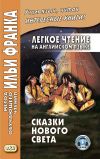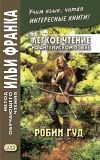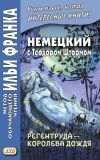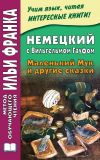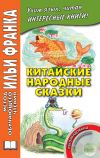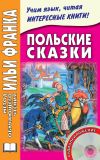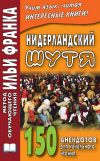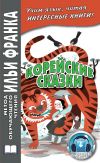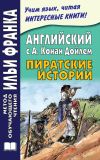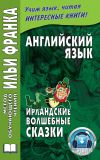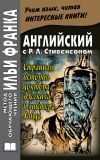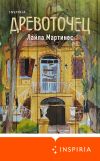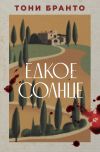Текст книги "Английский с Шерлоком Холмсом. Человек с рассеченной губой / Arthur Conan Doyle. Sherlock Holmes"
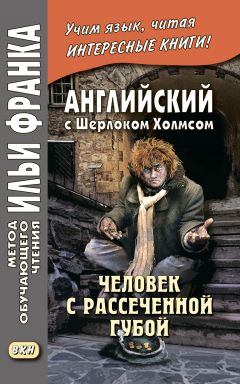
Автор книги: Артур Дойл
Жанр: Иностранные языки, Наука и Образование
Возрастные ограничения: +16
сообщить о неприемлемом содержимом
Текущая страница: 5 (всего у книги 21 страниц)
sunshine ['sʌnʃaɪn], vegetables ['veʤtəblz], metropolis [mɪ'trɒpəlɪs]
We made our way downstairs as quietly as possible, and out into the bright morning sunshine. In the road stood our horse and trap, with the half-clad stable-boy waiting at the head. We both sprang in, and away we dashed down the London Road. A few country carts were stirring, bearing in vegetables to the metropolis, but the lines of villas on either side were as silent and lifeless as some city in a dream.
“It has been in some points a singular case (в некоторых точках/моментах = отношениях необычайное дело),” said Holmes, flicking the horse on into a gallop (пуская лошадь галопом; to flick – слегка ударить, стегнуть). “I confess (признаюсь) that I have been as blind as a mole (был слепым, как крот), but it is better to learn wisdom late than never to learn it at all (но лучше поумнеть: «научиться мудрости» поздно, чем никогда /не поумнеть/ вообще).”
In town the earliest risers were just beginning to look sleepily from their windows (в городе самые рано вставшие/встающие только начинали выглядывать сонно из окон; to rise – вставать, подниматься) as we drove through the streets of the Surrey side. Passing down (миновав) the Waterloo Bridge Road we crossed over the river (пересекли реку), and dashing up (проехав на большой скорости) Wellington Street wheeled sharply to the right (свернули резко направо) and found ourselves (очутились) in Bow Street. Sherlock Holmes was well known to the force (был хорошо известен полиции; force – сила; вооруженная группа людей), and the two constables at the door saluted him (два констебля у двери отдали ему честь). One of them held the horse's head (взял лошадь под уздцы) while the other led us in (другой повел нас внутрь).
singular ['sɪŋɡjʋlə], blind [blaɪnd], wisdom ['wɪzdəm], riser ['raɪzə], river ['rɪvə], wheeled [wi:ld]
“It has been in some points a singular case,” said Holmes, flicking the horse on into a gallop. “I confess that I have been as blind as a mole, but it is better to learn wisdom late than never to learn it at all.”
In town the earliest risers were just beginning to look sleepily from their windows as we drove through the streets of the Surrey side. Passing down the Waterloo Bridge Road we crossed over the river, and dashing up Wellington Street wheeled sharply to the right and found ourselves in Bow Street. Sherlock Holmes was well known to the force, and the two constables at the door saluted him. One of them held the horse's head while the other led us in.
“Who is on duty (кто на дежурстве = дежурный)?” asked Holmes.
“Inspector Bradstreet, sir.”
“Ah, Bradstreet, how are you (как поживаете)?” A tall, stout official (высокий, полный сотрудник) had come down the stone-flagged passage (пришел из вымощенного камнем коридора), in a peaked cap and frogged jacket (в форменной фуражке и зеленом пиджаке). “I wish to have a quiet word with you (хочу поговорить c вами: «иметь спокойное слово»), Bradstreet.” “Certainly, Mr. Holmes. Step into my room here (зайдите в мою комнату).” It was a small, office-like room (похожая на контору комната), with a huge ledger upon the table (с огромной книгой для записей на столе), and a telephone projecting from the wall (висящем на стене; to project – выступать, нависать). The inspector sat down at his desk (сел за стол).
official [ə'fɪʃl], passage ['pæsɪʤ], ledger ['leʤə]
“Who is on duty?” asked Holmes.
“Inspector Bradstreet, sir.”
“Ah, Bradstreet, how are you?” A tall, stout official had come down the stone-flagged passage, in a peaked cap and frogged jacket. “I wish to have a quiet word with you, Bradstreet.” “Certainly, Mr. Holmes. Step into my room here.” It was a small, office-like room, with a huge ledger upon the table, and a telephone projecting from the wall. The inspector sat down at his desk.
“What can I do for you (что я могу сделать для вас), Mr. Holmes?”
“I called about that beggarman, Boone (я спрашивал о том нищем, Буне) – the one who was charged with being concerned in the disappearance (который обвинен в том, что имел дело с = замешан в /деле/ исчезновения) of Mr. Neville St. Clair, of Lee.”
“Yes. He was brought up and remanded for further inquiries (он был арестован и привезен сюда для доследования = допроса; to remand – отсылать обратно на доследование).”
“So I heard (так я слышал = знаю). You have him here?”
“What can I do for you, Mr. Holmes?”
“I called about that beggarman, Boone – the one who was charged with being concerned in the disappearance of Mr. Neville St. Clair, of Lee.”
“Yes. He was brought up and remanded for further inquiries.”
“So I heard. You have him here?”
“In the cells (в камере).”
“Is he quiet (он тихий = не буянит)?”
“Oh, he gives no trouble (не доставляет хлопот). But he is a dirty scoundrel (грязный негодяй).”
“Dirty?”
“Yes, it is all we can do to make him wash his hands (все, что мы могли сделать – так это заставить его вымыть руки), and his face is as black as a tinker's (его лицо такое же черное, как у медника). Well, when once his case has been settled (когда его дело /будет/ завершено), he will have a regular prison bath (он примет обычную тюремную ванну); and I think, if you saw him (если бы вы видели его), you would agree with me that he needed it (вы согласились бы со мной, что он нуждается в ней).”
“I should like to see him very much (я очень хотел бы увидеть его).”
tinker ['tɪŋkǝ], regular ['reɡjʋlǝ], prison ['prɪzn]
“In the cells.”
“Is he quiet?”
“Oh, he gives no trouble. But he is a dirty scoundrel.”
“Dirty?”
“Yes, it is all we can do to make him wash his hands, and his face is as black as a tinker's. Well, when once his case has been settled, he will have a regular prison bath; and I think, if you saw him, you would agree with me that he needed it.”
“I should like to see him very much.”
“Would you (хотите)? That is easily done (это легко сделано = нетрудно устроить). Come this way (идите сюда). You can leave your bag (можете оставить свою сумку).”
“No, I think that I'll take it (возьму).”
“Very good. Come this way, if you please (будьте добры).” He led us down a passage, opened a barred door (дощатую дверь), passed down a winding stair (спустился по винтовой лестнице), and brought us to a whitewashed corridor (привел нас в побеленный коридор) with a line of doors on each side (с рядом дверей на каждой стороне).
“The third on the right is his (третья справа – его /камера/),” said the inspector. “Here it is!” He quietly shot back a panel in the upper part of the door (тихо отодвинул дощечку в верхней части двери) and glanced through (заглянул /в отверстие/).
barred [bɑ:d], winding ['waɪndɪŋ], whitewashed ['waɪtwɒʃt]
“Would you? That is easily done. Come this way. You can leave your bag.”
“No, I think that I'll take it.”
“Very good. Come this way, if you please.” He led us down a passage, opened a barred door, passed down a winding stair, and brought us to a whitewashed corridor with a line of doors on each side.
“The third on the right is his,” said the inspector. “Here it is!” He quietly shot back a panel in the upper part of the door and glanced through.
“He is asleep (спит),” said he. “You can see him very well.”
We both put our eyes to the grating (мы оба приникли к решетке). The prisoner lay with his face towards us (заключенный лежал /с/ лицом к нам), in a very deep sleep (в очень глубоком сне), breathing slowly and heavily (дыша медленно и тяжело). He was a middle-sized man (среднего размера = роста мужчина), coarsely clad as became his calling (грубо одет, как подобает его профессии), with a colored shirt (с цветной рубашкой) protruding through the rent in his tattered coat (торчащей через дыры его порванного пиджака). He was, as the inspector had said, extremely dirty (чрезвычайно грязный), but the grime which covered his face (но глубоко въевшаяся грязь, которая покрывала его лицо) could not conceal its repulsive ugliness (не могла скрыть отталкивающего безобразия). A broad wheal from an old scar (широкий старый шрам; wheal – волдырь) ran right across it from eye to chin (шел от глаза к подбородку), and by its contraction (по этому уплотнению) had turned up one side of the upper lip (поднимал вверх одну сторону верхней губы), so that three teeth were exposed in a perpetual snarl (так, что три зуба были выставлены в бесконечном рычании = торчали постоянным оскалом). A shock (клок) of very bright red hair grew low over his eyes and forehead (падал на глаза и лоб; to grow over – зарастать).
“He's a beauty, isn't he (он красавец, не правда ли)?” said the inspector.
grating ['ɡreɪtɪŋ], breathing ['bri:ðɪŋ], coarsely ['kɔ:slɪ], grime [ɡraɪm], repulsive [rɪ'pʌlsɪv]
“He is asleep,” said he. “You can see him very well.”
We both put our eyes to the grating. The prisoner lay with his face towards us, in a very deep sleep, breathing slowly and heavily. He was a middle-sized man, coarsely clad as became his calling, with a colored shirt protruding through the rent in his tattered coat. He was, as the inspector had said, extremely dirty, but the grime which covered his face could not conceal its repulsive ugliness. A broad wheal from an old scar ran right across it from eye to chin, and by its contraction had turned up one side of the upper lip, so that three teeth were exposed in a perpetual snarl. A shock of very bright red hair grew low over his eyes and forehead.
“He's a beauty, isn't he?” said the inspector.
“He certainly needs a wash (он определенно нуждается в мытье),” remarked Holmes. “I had an idea that he might (он мог бы /помыться/), and I took the liberty of bringing the tools with me (взял на себя волю принесения = принес инструменты /для этого/ с собой).” He opened the Gladstone bag as he spoke, and took out (вытащил), to my astonishment (к моему удивлению), a very large bath-sponge (очень большую губку).
“He! he! You are a funny one (вы шутник),” chuckled the inspector (хихикнул инспектор).
“Now, if you will have the great goodness to open that door (если вы соблаговолите открыть дверь) very quietly (очень тихо), we will soon make him cut a much more respectable figure (быстро придадим ему намного более респектабельный вид).”
liberty ['lɪbətɪ], sponge [spʌnʤ]
“He certainly needs a wash,” remarked Holmes. “I had an idea that he might, and I took the liberty of bringing the tools with me.” He opened the Gladstone bag as he spoke, and took out, to my astonishment, a very large bath-sponge.
“He! he! You are a funny one,” chuckled the inspector.
“Now, if you will have the great goodness to open that door very quietly, we will soon make him cut a much more respectable figure.”
“Well, I don't know why not (не знаю, почему нет = согласен),” said the inspector. “He doesn't look a credit to the Bow Street cells (он не делает чести /своим видом/ тюрьме на Боу-Стрит; credit – хорошая репутация, честь), does he?” He slipped his key into the lock (сунул ключ в замок), and we all very quietly entered the cell (вошли в камеру). The sleeper half turned (спящий повернулся наполовину = шевельнулся), and then settled down once more into a deep slumber (затем снова погрузился в глубокий сон; to settle down – осесть, поселиться). Holmes stooped to the water jug (наклонился к кувшину для воды), moistened his sponge (смочил губку), and then rubbed it twice vigorously (потер ею дважды энергично) across and down the prisoner's face.
“Let me introduce you (позвольте мне представить вас),” he shouted (крикнул), “to Mr. Neville St. Clair, of Lee, in the county of Kent (мистеру Невиллу Сент-Клеру из Ли, в графстве Кент).”
credit ['kredɪt], key [ki:], slumber ['slʌmbə], vigorously ['vɪɡərəslɪ]
“Well, I don't know why not,” said the inspector. “He doesn't look a credit to the Bow Street cells, does he?” He slipped his key into the lock, and we all very quietly entered the cell. The sleeper half turned, and then settled down once more into a deep slumber. Holmes stooped to the water jug, moistened his sponge, and then rubbed it twice vigorously across and down the prisoner's face.
“Let me introduce you,” he shouted, “to Mr. Neville St. Clair, of Lee, in the county of Kent.”
Never in my life have I seen such a sight (никогда в жизни не видел я такого зрелища). The man's face peeled off under the sponge like the bark from a tree (лицо снялось под /действием/ губки, как кора с дерева; peel – кожица, корка; to peel – снимать кожицу, кору). Gone was the coarse brown tint (исчез грубый коричневый оттенок = загар)! Gone, too, the horrid scar (исчез также ужасный шрам) which had seamed it across (бороздил /все лицо/; seam – шов), and the twisted lip (разрезанная: «скрученная/изогнутая» губа) which had given the repulsive sneer to the face (которая придавала отталкивающую ухмылку лицу)! A twitch brought away the tangled red hair (резкое движение /Холмса/ убрало спутанные рыжие волосы), and there, sitting up in his bed (сидя в кровати), was a pale (бледный), sad-faced (печальный), refined-looking man (утонченно выглядящий человек), black-haired and smooth-skinned (черноволосый и нежнокожий), rubbing his eyes and staring about him with sleepy bewilderment (потирающий глаза и глядящий вокруг себя с сонным недоумением). Then suddenly realizing the exposure (внезапно осознав «выставление на вид» = что его выставили на вид/раскрыли), he broke into a scream (вскрикнул) and threw himself down with his face to the pillow (и зарылся головой в подушку).
sneer [snɪə], tangled ['tæŋɡld], bewilderment [bɪ'wɪldəmənt], exposure [ɪk'spəʋʒə]
Never in my life have I seen such a sight. The man's face peeled off under the sponge like the bark from a tree. Gone was the coarse brown tint! Gone, too, the horrid scar which had seamed it across, and the twisted lip which had given the repulsive sneer to the face! A twitch brought away the tangled red hair, and there, sitting up in his bed, was a pale, sad-faced, refined-looking man, black-haired and smooth-skinned, rubbing his eyes and staring about him with sleepy bewilderment. Then suddenly realizing the exposure, he broke into a scream and threw himself down with his face to the pillow.
“Great heavens (о Господи: «великие небеса»)!” cried the inspector, “it is, indeed, the missing man (пропавший человек). I know him from the photograph (я узнаю его благодаря фотографии).”
The prisoner turned with the reckless air of a man (повернулся с безнадежным видом человека; reckless – бездумный; безразличный) who abandons himself to his destiny (который предает себя своей судьбе = не противится судьбе). “Be it so (будь что будет),” said he. “And pray what am I charged with (пожалуйста /объясните/, в чем я обвиняюсь)?”
“With making away with Mr. Neville St. (в убийстве мистера Невилла Сент – …). Oh, come (ну), you can't be charged with that (вы не можете быть обвинены в этом) unless they make a case of attempted suicide of it (если только они заведут дело о попытке самоубийства),” said the inspector with a grin (с усмешкой). “Well, I have been twenty-seven years in the force (я двадцать семь лет /служу/ в полиции), but this really takes the cake (действительно занимает первое место: «берет пирог» = ничего подобного не видел).”
abandon [ə'bændən], destiny ['destɪnɪ], charged [tʃɑ:ʤd],suicide ['su:ɪsaɪd], cake [keɪk]
“Great heavens!” cried the inspector, “it is, indeed, the missing man. I know him from the photograph.”
The prisoner turned with the reckless air of a man who abandons himself to his destiny. “Be it so,” said he. “And pray what am I charged with?”
“With making away with Mr. Neville St. – Oh, come, you can't be charged with that unless they make a case of attempted suicide of it,” said the inspector with a grin. “Well, I have been twenty-seven years in the force, but this really takes the cake.”
“If I am Mr. Neville St. Clair, then it is obvious (очевидно) that no crime has been committed (что никакого преступления не было совершено), and that, therefore (следовательно), I am illegally detained (незаконно задержан).”
“No crime, but a very great error (очень большая ошибка) has been committed,” said Holmes. “You would have done better to have trusted your wife (вы сделали бы лучше, если = зря вы не доверились вашей жене).”
“It was not the wife (это была не жена = дело не в жене); it was the children,” groaned the prisoner (простонал заключенный). “God help me (да поможет мне Бог), I would not have them ashamed of their father (я не хотел /бы/, чтобы они стыдились своего отца). My God! What an exposure (какой позор)! What can I do?”
obvious ['ɒbvɪəs], therefore ['ðeəfɔ:], detained [dɪ'teɪnd]
“If I am Mr. Neville St. Clair, then it is obvious that no crime has been committed, and that, therefore, I am illegally detained.”
“No crime, but a very great error has been committed,” said Holmes. “You would have done better to have trusted your wife.”
“It was not the wife; it was the children,” groaned the prisoner. “God help me, I would not have them ashamed of their father. My God! What an exposure! What can I do?”
Sherlock Holmes sat down beside him on the couch (сел рядом с ним на койку) and patted him kindly on the shoulder (похлопал его ласково по плечу).
“If you leave it to a court of law to clear the matter up (если вы оставите /это/ суду /общей юрисдикции/ разбираться в этом деле),” said he, “of course you can hardly avoid publicity (едва ли избежите огласки). On the other hand (с другой стороны), if you convince the police authorities (если вы убедите полицейские органы) that there is no possible case against you (что нет возможного дела против вас = нет никакой вины), I do not know that there is any reason (я не знаю, какое есть основание) that the details should find their way into the papers (чтобы подробности нашли путь в газеты = то газеты ничего не узнают). Inspector Bradstreet would, I am sure (уверен), make notes upon anything which you might tell us (сделает записи = запишет все, что вы можете рассказать нам) and submit it to the proper authorities (и предоставит это надлежащим властям). The case would then never go into court at all (дело тогда никогда не попадет в суд вообще).”
court [kɔ:t], publicity [pʌb'lɪsǝtɪ], authorities [ɔ:'θɒrǝtɪz], proper ['prɒpə]
Sherlock Holmes sat down beside him on the couch and patted him kindly on the shoulder.
“If you leave it to a court of law to clear the matter up,” said he, “of course you can hardly avoid publicity. On the other hand, if you convince the police authorities that there is no possible case against you, I do not know that there is any reason that the details should find their way into the papers. Inspector Bradstreet would, I am sure, make notes upon anything which you might tell us and submit it to the proper authorities. The case would then never go into court at all.”
“God bless you (благослови вас Бог)!” cried the prisoner passionately (горячо). “I would have endured imprisonment (я бы вынес заключение), aye (да), even execution (даже казнь), rather than have left my miserable secret as a family blot to my children (вместо того, чтобы = только бы не оставить моей жалкой тайны как семейное бесчестье моим детям = лишь бы не опозорить детей; blot – пятно).
“You are the first (вы первые) who have ever heard my story (кто когда-либо слышал = кто услышит мою историю). My father was a schoolmaster (был школьным учителем) in Chesterfield, where I received an excellent education (где я получил превосходное образование). I travelled in my youth (путешествовал в молодости), took to the stage (поступил в театр), and finally became a reporter (наконец стал репортером) on an evening paper in London (в вечерней газете в Лондоне). One day my editor (редактор) wished to have a series of articles upon begging in the metropolis (серию статей о нищенстве в столице), and I volunteered to supply them (вызвался добровольно написать: «поставить» их). There was the point from which all my adventures started (точка, с которой все мои приключения начались). It was only by trying begging as an amateur (только пробованием попрошайничества как любитель) that I could get the facts upon which to base my articles (я мог добыть факты, чтобы основать = написать статьи). When an actor (как актер) I had, of course, learned all the secrets of making up (изучил все секреты гримирования), and had been famous in the greenroom (славился в артистической среде /грим-уборной/) for my skill (за мое умение). I took advantage now of my attainments (извлек выгоду из моих знаний; attainment – достижение, приобретение; attainments – образованность, знание). I painted my face (раскрасил лицо), and to make myself as pitiable as possible (и чтобы сделать себя таким жалким, как только возможно = для большей жалости) I made a good scar (сделал = нарисовал изрядный шрам) and fixed one side of my lip in a twist (установил одну сторону губы в искривленном положении) by the aid of a small slip of flesh-colored plaster (с помощью маленькой полоски телесного цвета пластыря). Then with a red head of hair (с красной головой волос = рыжим париком), and an appropriate dress (соответствующей одеждой), I took my station in the business part of the city (занял положение в деловой части города), ostensibly as a match-seller (якобы: «по видимости» как продавец спичек) but really as a beggar (на самом деле – как нищий). For seven hours I plied my trade (семь часов я занимался моим ремеслом), and when I returned home (возвратился домой) in the evening I found, to my surprise (обнаружил, к своему удивлению), that I had received no less than 26 shillings and fourpence (что получил не меньше 26 шиллингов и четырех пенсов).
passionately ['pæʃənɪtlɪ], endured [ɪn'djʋəd], execution [,eksɪ'kju:ʃn], schoolmaster ['sku:lmɑ:stə], article ['ɑ:tɪkl], volunteered [,vɒlən'tɪəd], amateur ['æmətə]
“God bless you!” cried the prisoner passionately. “I would have endured imprisonment, aye, even execution, rather than have left my miserable secret as a family blot to my children.
“You are the first who have ever heard my story. My father was a schoolmaster in Chesterfield, where I received an excellent education. I travelled in my youth, took to the stage, and finally became a reporter on an evening paper in London. One day my editor wished to have a series of articles upon begging in the metropolis, and I volunteered to supply them. There was the point from which all my adventures started. It was only by trying begging as an amateur that I could get the facts upon which to base my articles. When an actor I had, of course, learned all the secrets of making up, and had been famous in the greenroom for my skill. I took advantage now of my attainments. I painted my face, and to make myself as pitiable as possible I made a good scar and fixed one side of my lip in a twist by the aid of a small slip of flesh-colored plaster. Then with a red head of hair, and an appropriate dress, I took my station in the business part of the city, ostensibly as a match-seller but really as a beggar. For seven hours I plied my trade, and when I returned home in the evening I found, to my surprise, that I had received no less than 26 shillings and fourpence.
“I wrote my articles (написал статьи) and thought little more of the matter until (почти позабыл: «думал мало больше» об этом, пока), some time later (некоторое время спустя), I backed a bill for a friend (поручился заплатить за приятеля: «поддержал счет»; bill – счет) and had a writ served upon me for 25 pounds (иск/извещение, врученное мне на /уплату/ 25 фунтов). I was at my wit's end (понятия не имел: «был на краю ума») where to get the money (где достать деньги), but a sudden idea came to me (неожиданная идея пришла ко мне). I begged a fortnight's grace from the creditor (попросил двухнедельную отсрочку у кредитора), asked for a holiday from my employers (попросил об отпуске у работодателей), and spent the time (провел это время) in begging in the City (нищенствуя в Сити) under my disguise (под маскировкой = переодетым; to disguise – переодевать, маскировать). In ten days (за десять дней) I had the money and had paid the debt (уплатил долг).
idea [aɪ'dɪə], fortnight ['fɔ:tnaɪt], employers [ɪm'plɔɪəz], debt [det]
“I wrote my articles and thought little more of the matter until, some time later, I backed a bill for a friend and had a writ served upon me for 25 pounds. I was at my wit's end where to get the money, but a sudden idea came to me. I begged a fortnight's grace from the creditor, asked for a holiday from my employers, and spent the time in begging in the City under my disguise. In ten days I had the money and had paid the debt.
“Well, you can imagine (можете представить) how hard it was to settle down to arduous work at 2 pounds a week (как трудно было засесть за тяжелую работу за два фунта в неделю) when I knew that I could earn as much in a day (мог бы заработать столько же за день) by smearing my face with a little paint (вымазав лицо небольшим количеством краски), laying my cap on the ground (положив кепку на землю), and sitting still (и сидя тихо). It was a long fight (долгая борьба) between my pride and the money (между моей гордостью и деньгами), but the dollars won at last (деньги: «доллары» победили в конце концов; to win), and I threw up reporting (забросил репортерство) and sat day after day in the corner (сидел день за днем на углу) which I had first chosen (который я /с самого/ начала выбрал), inspiring pity by my ghastly face (внушая жалость жутким/наводящим ужас лицом) and filling my pockets with coppers (и наполняя карманы медяками). Only one man knew my secret (только один человек знал мою тайну). He was the keeper of a low den (владелец низкопробного: «низкого» притона) in which I used to lodge (в котором я снимал комнату) in Swandam Lane, where I could every morning emerge as a squalid beggar (где я мог каждое утро появляться как грязный нищий) and in the evenings transform myself (по вечерам превращаться) into a well-dressed man about town (в хорошо одетого городского человека: «около города»; about town – известный; светский). This fellow (этот парень), a Lascar, was well paid by me for his rooms (хорошо получал от меня за свои комнаты), so that I knew that my secret was safe in his possession (потому я знал, что моя тайна была в безопасности в его владении = он ничего никому не скажет).
arduous ['ɑ:djʋǝs], inspiring [ɪn'spaɪǝrɪŋ], possession [pǝ'zeʃn]
“Well, you can imagine how hard it was to settle down to arduous work at 2 pounds a week when I knew that I could earn as much in a day by smearing my face with a little paint, laying my cap on the ground, and sitting still. It was a long fight between my pride and the money, but the dollars won at last, and I threw up reporting and sat day after day in the corner which I had first chosen, inspiring pity by my ghastly face and filling my pockets with coppers. Only one man knew my secret. He was the keeper of a low den in which I used to lodge in Swandam Lane, where I could every morning emerge as a squalid beggar and in the evenings transform myself into a well-dressed man about town. This fellow, a Lascar, was well paid by me for his rooms, so that I knew that my secret was safe in his possession.
“Well, very soon I found (очень скоро я обнаружил) that I was saving considerable sums of money (что я откладывал значительные суммы денег; to save – спасать, сохранять; экономить). I do not mean (не имею в виду = не думаю) that any beggar in the streets of London could earn (мог заработать) 700 pounds a year – which is less than my average takings (что меньше, чем мои средние сборы) – but I had exceptional advantages (исключительные преимущества) in my power of making up (в моем мастерстве гримирования), and also in a facility of repartee (в способности остроумия), which improved by practice (улучшилось практикой) and made me quite a recognized character in the City (сделало меня довольно узнаваемым персонажем в Сити). All day a stream of pennies (поток пенсов), varied by silver (вперемешку с серебром), poured in upon me (лился на меня), and it was a very bad day in which I failed to take 2 pounds (в который я не мог собрать двух фунтов).
“As I grew richer I grew more ambitious (чем богаче я становился, тем более честолюбивым /становился/; to grow – расти), took a house in the country (снял дом в деревне = за городом), and eventually married (со временем женился), without anyone having a suspicion as to my real occupation (без кого-либо, имеющего подозрение о моем настоящем занятии). My dear wife knew that I had business in the City (что у меня были дела в Сити). She little knew what (она мало знала какие /именно/).
earn [ɜ:n], average ['ævərɪʤ], exceptional [ɪk'sepʃənl], facility [fə'sɪlǝtɪ], poured [pɔ:d], ambitious [æm'bɪʃəs], eventually [ɪ'ventʃʋəlɪ], suspicion [sə'spɪʃn]
“Well, very soon I found that I was saving considerable sums of money. I do not mean that any beggar in the streets of London could earn 700 pounds a year – which is less than my average takings – but I had exceptional advantages in my power of making up, and also in a facility of repartee, which improved by practice and made me quite a recognized character in the City. All day a stream of pennies, varied by silver, poured in upon me, and it was a very bad day in which I failed to take 2 pounds.
“As I grew richer I grew more ambitious, took a house in the country, and eventually married, without anyone having a suspicion as to my real occupation. My dear wife knew that I had business in the City. She little knew what.
“Last Monday (в прошлый понедельник) I had finished for the day (закончил /работу/ на тот день) and was dressing in my room above the opium den (одевался в моей комнате над опиумным приютом) when I looked out of my window (выглянул в окно) and saw, to my horror and astonishment (к своему ужасу и удивлению), that my wife was standing in the street (что моя жена стояла на улице), with her eyes fixed full upon me (с глазами, устремленными прямо на меня). I gave a cry of surprise (издал крик = вскрикнул от удивления), threw up my arms to cover my face (/резко/ поднял руки, чтобы закрыть лицо; to throw – бросать), and, rushing to my confidant (бросившись к моему доверенному лицу), the Lascar, entreated him to prevent anyone from coming up to me (умолял его не пускать никого наверх ко мне; to prevent – предотвратить). I heard her voice downstairs (слышал ее голос внизу), but I knew that she could not ascend (не может подняться). Swiftly I threw off my clothes (быстро я сбросил одежду), pulled on those of a beggar (натянул одежду нищего), and put on my pigments and wig (нанес краску и /надел/ парик). Even a wife's eyes could not pierce so complete a disguise (даже глаза жены не могли узнать меня в такой глубокой маскировке; to pierce – протыкать, пронизывать). But then it occurred to me (мне пришло в голову) that there might be a search (обыск) in the room, and that the clothes might betray me (одежда может выдать меня). I threw open the window (распахнул окно), reopening by my violence a small cut (вновь открывшее = заставившее из-за моей стремительности /кровоточить/ маленький порез) which I had inflicted upon myself (нанес: «причинил» себе) in the bedroom that morning. Then I seized my coat (схватил пиджак), which was weighted by the coppers (нагружен медяками) which I had just transferred (переложил) to it from the leather bag (из кожаной сумки) in which I carried my takings (в которой носил свои сборы). I hurled it out of the window (швырнул из окна), and it disappeared into the Thames (исчез в Темзе). The other clothes would have followed (остальная одежда последовала бы), but at that moment there was a rush of constables (спешка, суета констеблей) up the stair (вверх по лестнице), and a few minutes after I found (спустя несколько минут я обнаружил), rather, I confess, to my relief (скорее, должен сказать, к своему облегчению; to confess – исповедоваться; признаваться), that instead of being identified as Mr. Neville St. Clair (вместо того, чтобы быть опознанным как…), I was arrested as his murderer (я был арестован как его убийца).
Правообладателям!
Это произведение, предположительно, находится в статусе 'public domain'. Если это не так и размещение материала нарушает чьи-либо права, то сообщите нам об этом.